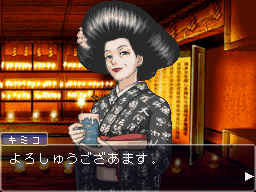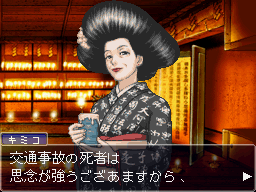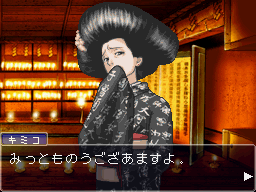For example: arigatai 有り難い, "unlikely," "thankful," becoming arigatou 有り難う in arigatou-gozaimasu 有難う御座います.
Game: Gyakuten Saiban 2 逆転裁判2
連用形
The u-onbin is often seen in the ren'youkei 連用形 form of words.This can happen with i-adjectives and with verbs.
Both cases are extremely traditional and not really common in modern Japanese. They're also relatively more common in the kansai 関西 region of Japan, as opposed to around Tokyo, for example.
In anime, if a character speaks using u-onbin, it's probably because they're extremely traditional or anachronistic. There's a chance they're from kansai, but it's more likely that they just don't speak casual, modern Japanese at all.
The above applies only to u-onbin used with random words. Some expressions, like arigatou-gozaimasu, are used commonly through Japan, and wouldn't imply anything in particular about the person using the word.
~うございます
For i-adjectives, the ren'youkei form is the adverbial form, and is used when the adjective modifies a verb, instead of a noun.- hayai hito
早い人
An early person.
A quick person.- This is the rentaikei 連体形.
- hayaku okiru
早く起きる
To wake up early.- This is the ren'youkei 連用形.
When this ren'youkei form comes before the verbs gozaimasu ございます, "to be," and zonjimasu 存じます, "to think," the u-onbin happens.
- mada hayai desu
まだ早いです
[It's] still early, - mada hayou gozaimasu
まだ早うございます
(same meaning.) - mada hayou zonjimasu
まだ早う存じます
[I] think [it] is still early.
Note that the change in pronunciation extends beyond the okurigana. The word was hayai はやい, it became hayou はよう. Even the ya や changed into yo よ in this case.
Some examples of this change in pronunciation in common Japanese expressions include:
- ohayou gozaimasu
お早うございます
Good morning.- o お - honorific prefix.
- hayai
早い
Early. Quick.
- arigatou gozaimasu
ありがとうございます
Thank you.- arigatai
有り難い
Difficult to have. Unlikely to obtain. (compound adjective.)
Something which you're grateful for getting. - aru 有る
To have. To possess. - ~gatai ~難い
Hard to.
- arigatai
- omedetou gozaimasu
おめでとうございます
Congratulations.- medetai
めでたい
Auspicious. Something that should be celebrated.
- medetai
Beyond the above, you aren't dealing with normal Japanese anymore. You're dealing with some very formal Japanese, or archaic Japanese, or some dialect of Japanese.
Nevertheless, there are grammatical rules to how words are affected by u-onbin.
Adjectives that end in ~oi and ~ai become ~ou. Adjectives that end in ~ii and ~ui become ~uu.
- omoshiroi 面白い
omoshirou 面白う
Entertaining. Funny. - nagai 長い
nagou 長う
Long. - karui 軽い
karuu 軽う
Light. - utsukushii 美しい
utsukushuu 美しゅう
Beautiful.
There are a few things worth nothing about this.
The hojo-doushi 補助動詞 gozaimasu has a number of variants, like gozaamasu ござあます, zaamasu ざあます, zamasu ざます, and zansu ざんす. All of such words elicit u-onbin, too.
Game: Gyakuten Saiban 2 逆転裁判2
- Kimiko
キミコ
(character name.) - koutsuu jiko no shisha wa
shinen ga tsuyou gozaamasu kara,
交通事故の死者は思念が強うござあますから、
Since the dead of traffic accidents have powerful feelings,- tsuyoi
強い
Strong. Powerful. - ____ wa ____ ga ____
〇〇は××が△△
A double subject construction.
- tsuyoi
Japanese has a number of adjectives that end in ~shii ~しい. They become ~shuu ~しゅう through u-onbin.
Game: Gyakuten Saiban 2 逆転裁判2
- Kimiko
キミコ
(character name.) - yoroshuu gozaamasu.
よろしゅうござあます。
(...same as...)- yoroshii
よろしい
Very well.
That's fine.
It's alright.
Okay.
- yoroshii
When nai ない is affected by u-onbin, it becomes nou のう, which sounds seriously weird, to be completely honest.
Game: Gyakuten Saiban 2 逆転裁判2
- Kimiko
キミコ
(character name.) - mittomonou gozaamasu yo.
みっとものうござあますよ。
(...same as...)- mittomonai yo
見っともないよ
[It] is shameful, disgraceful, unsightly.
- mittomonai yo
Similarly, the ~tai ~たい suffix would become ~tou ~とう.
- tabetou gozaimasu
食べとうございます
(...same as...)- tabetai
食べたい
[I] want to eat [it].
- tabetai
~うて
In the ren'youkei form of verbs, u-onbin replaces ku く, gu ぐ, hi ひ, bi び, mi み, and so on.Note: in modern Japanese, verbs that conjugate to ~hi ~ひ probably don't exist anymore, but such verbs existed in the past. They're the so-called ha-row yodan verbs. Nowadays, such verbs would be godan verbs instead.
For example, omofu 思ふ, "to feel," is an yodan verb and archaic variant of omou 思う.
If you conjugated omofu 思ふ to ren'youkei, it would become omohi 思ひ, then adding the te て jodoushi 助動詞, omohi-te 思ひて, and after u-onbin: omoute 思うて.
This sort of u-onbin seems to be over one thousand years old, so it's mostly studied when dealing with reading literature from the Heian 平安 period (794–1185), and stuff like that.
Despite this, it seems to be still in use in kansai 関西, for some reason, so it's not like it's completely obsolete yet.
Note that for verbs ending in ~bu ~ぶ and ~mu ~む, the te-form would gets dakuten 濁点. This is true both in the past as well as in the present.
- yobu
呼ぶ
To call. - yonde
呼んで
(usual te-form.) - youde
呼うで
(u-onbin.)
- tanomu
頼む
To entrust. To request. To ask. - tanonde
頼んで
(usual te-form.) - tanoude
頼うで
(u-onbin.)
Other Words
Some words were originally pronounced in a certain way, but due to u-onbin are pronounced with an u う in modern times.A pair of good examples are imouto 妹 and otouto 弟. Both words originally ended in hito ひと, "person." But due to u-onbin the hi ひ ended up being pronounced as u う, hence the ~uto うと in both words.
References
- ウ音便 - kotobank.jp, accessed 2019-11-08.
- 文法についてです。ウ音便の仕方がわからないのです - detail.chiebukuro.yahoo.co.jp, accessed 2019-11-08.
- 妹 - gogen-allguide.com, accessed 2019-11-08.
- 弟 - gogen-allguide.com, accessed 2019-11-08.
- 関西弁 「よろしく」「よろしゅう」 - detail.chiebukuro.yahoo.co.jp, accessed 2018-10-25.



No comments: